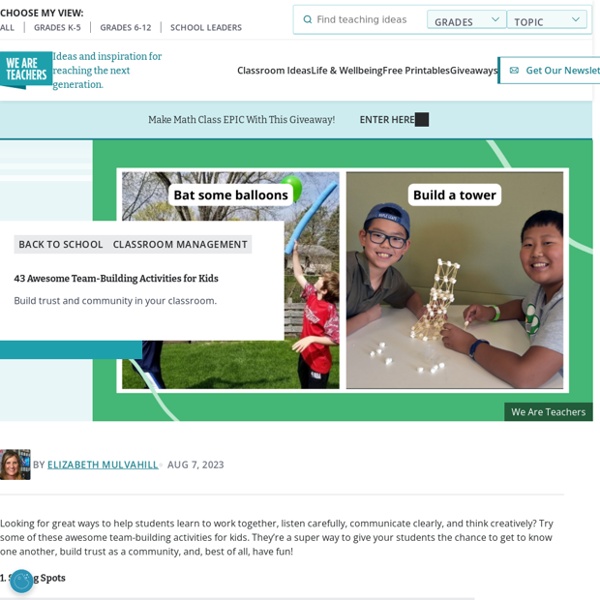Creating the Tallest Cup Tower: A STEM Challenge
Guest post by Tracey Graham of Growing a STEM Classroom STEM (Science, Technology, Engineering, and Math) is one of the current “buzz words” in the world of education today even though the STEM philosophy of teaching has been around for a very long time. STEM is all about students learning in a student-centered, question-based, subject-integrated classroom.
Fake News Resources for Teachers - Julie Smith
Resources to Help You Get Started: Super fun to have everyone jumping on the “fake news” bandwagon – we media literacy folks have been barking about this for YEARS! Welcome! =)
Getting to Know Each Other
Getting to know your students at the beginning of the year is crucial in establishing a strong teacher-student rapport. Take five to ten minutes several times during the first two weeks to engage students in activities that help them get to know each other. These activities also provide ways to practice active listening, expressing feelings, and cooperation. Here are some suggestions for ways to get to know each other: What Do We Have in Common?
Two Growth Mind-Set Activities to Help Motivate All Students and Teach Nature...
If you want to start the year building relationships, engaging in inquiry, planting the seeds of growth mindset, and learning about the nervous system...this is for you!!! The inspiration for the first set of activities is based on the NPR story Students' View of Intelligence Can Help Grades while the inspiration for the second of activities is based on the research done at four urban high schools by researchers at the Teachers College, Columbia University. Here is a link to all of the slides. Here is a link to the science struggle stories lesson plan.
Let's All Share What We Do As Future Ready Librarians In Each One Of The FRL Wedges!
I had such a wonderful time with our team as we worked with administrators, technology directors, principals, coaches and of course, lots of very special Future Ready Librarians. On the second day, as we examined, dissected and shared ways Future Ready Librarians lead, teach and serve within our libraries, schools and communities, one of my new friends, Becky Ackermann, came up to me with an idea from the collaborating they were doing at their table. Even though we took the FRL Framework apart on the first day together by breaking into 10 groups and...
Listening to Students
Last week, my son's third grade teacher sent home what at first glance looked like a long homework assignment -- three sets of survey questions with many lines for his responses. After reading the directions, we learned that I was to ask him the questions and transcribe his responses. Each night we settled down for what turned into a thoughtful, reflective conversation about my child: his reading preferences, learning style, interests, likes and dislikes, fears and hopes. I thought I knew my kid, but I was surprised by some of his responses -- "What distracts you more -- sound or movement?"
Meet Google Drive – One place for all your files
One account. All of Google. Sign in to continue to Google Drive Find my account Forgot password?
Day 6: Library Jenga – Lens into the Library
Ok… I needed a way to spruce up Library Orientation…and fast. After reflecting on my practice the last few years I knew that the students needed to be instructed on how to use the catalog, but I needed to make it fun and interactive. Library Jenga was a HIT! First, I took five classic Jenga sets and attached numbered stickers to roughly half of the blocks in each set (around 25 each).
How To Build Effortless Rapport With Students
Because it’s one of the most effective and most powerful ways to influence behavior, having a natural, trusting rapport with your students is crucial. Rapport provides the good vibrations between you and your class that makes your classroom management plan matter. It gives your plan its teeth, infusing it with meaning and muscle and dissuading students from ever wanting to disappoint you by breaking its contract.
Detective Game by Peter Pappas
I did not waste the opening week of school introducing the course – my students solved mysteries. I took simplified mysteries and split them into 25-30 clues, each on a single strip of paper. Read my blog post on how I used this lesson.
14 Resources for Citing Sources
Have you ever heard the saying that there is my truth, your truth, and somewhere in the middle, the real truth? Pinpointing the truth is the reason why I always find myself wanting to ask people to prove what they say. Let’s acknowledge this truth.
4 Quick Ways to Build Rapport With Students
Seventy high schoolers I’ve never met are either staring at me or pretending I don’t exist. I’ve come 750 miles from my home in Kalamazoo to spend a day teaching this diverse group of at-risk freshmen and sophomores. I have just 6 hours to build rapport with them, to shift their thinking, and to help them in any way I can. No matter how great my presentation is, no matter how well-thought out each lesson is, I know one thing: They will not listen to me until they like, trust, and respect me. Teaching a random group of students for just one day or one hour is one of the hardest aspects of public speaking.



